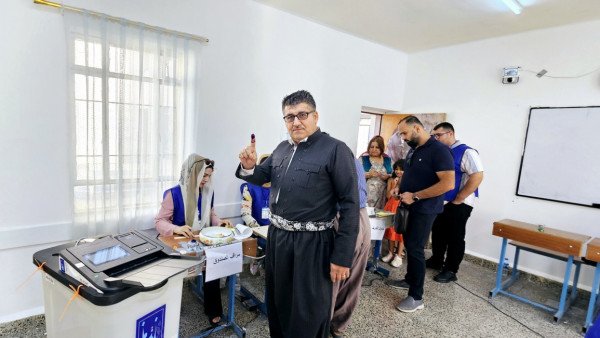About 2.9 million residents across the Kurdistan Region are registered to vote. [Dana Taib Menmy/TNA]
Amid ongoing investigations into electoral irregularities, Kurdish parties that emerged victorious in the October 20 parliamentary elections in Iraq’s Kurdistan region are locked in informal negotiations to form a new Kurdistan Regional Government (KRG).
Sources close to the talks suggest that cabinet formation could be delayed until after Iraq’s 2025 federal elections, underscoring the fragile political balance in the region and highlighting the long-standing power struggles among Kurdistan’s ruling factions.
Iraq’s Independent High Electoral Commission (IHEC) released the official results, positioning the Kurdistan Democratic Party (KDP) as the top party with 39 seats, followed by its rival, the Patriotic Union of Kurdistan (PUK), which secured 23 seats.
The opposition New Generation Movement, led by Shaswar Abdul Wahid, emerged as a formidable force, claiming 15 seats. Despite these results, several opposition groups, including the Kurdistan Justice Group (KJG) and the Kurdistan Islamic Union (KIU), have rejected the outcome, alleging widespread voter fraud and tampering—claims that both the IHEC and the winning parties have firmly dismissed.
The reported voter turnout reached 72 percent, with five of the 100 seats reserved for minority groups, leaving the remaining 95 seats contested among Kurdish factions. The election results renew a traditional power-sharing arrangement between the KDP and PUK, who have jointly ruled the Kurdistan region since it achieved semi-autonomy in 1991. However, unresolved tensions between the two have already begun to obstruct the cabinet formation process.
Power-sharing deadlock
The KDP has asserted that its electoral victory entitles it to both the KRG prime ministership and the Kurdistan region’s presidency. Currently, Masrour Barzani serves as KRG Prime Minister, and Nechirvan Barzani as president, roles critical to maintaining the influence of the Barzani family within the KDP.
The PUK, however, is pressing for a power-sharing agreement that would see it gain at least one of these senior positions, suggesting that Qubad Talabani, currently the KRG deputy PM, take on either the premiership or the presidency. Alternatively, PUK leaders may accept the status quo if they retain control over the KRG’s interior ministry, currently overseen by the KDP.
Sources close to the negotiations indicate that an agreement is unlikely to be reached before Iraq’s national parliamentary elections in late 2025. “The power-sharing arrangement in the Kurdistan region is closely tied to the position of Iraq’s president,” a Kurdish source involved in the talks told The New Arab, requesting anonymity.
“It’s likely that we will not see a new KRG cabinet until after those elections,” the source added.
Opposition parties have alleged that the election was marred by fraud, accusing the KDP, PUK, and New Generation Movement of using electronic interference to manipulate vote counts. The KJG has declared the new parliament “illegitimate” and has threatened to boycott its proceedings. If KJG members refuse to take their oaths, they risk replacement by other candidates, raising concerns about representation and legitimacy.
IHEC spokesperson Jumana al-Ghalay told TNA that the commission will forward all official complaints to its legal team, which has a 10-day window to review and resolve them. Afterward, IHEC’s Commissioner Council will finalise and ratify the election results. Under Kurdish parliamentary rules, once results are confirmed, parliament must hold its first session within 10 days, during which members will vote to elect a speaker, deputy speaker, and secretary, marking the formal start of Kurdistan’s legislative process.
New Generation Movement, a roadmap?
The New Generation Movement has proposed a reform-driven roadmap for power-sharing in the KRG. Abdul Wahid’s party has stated it will only join the government if it holds the KRG prime ministership, while also insisting that any party leading the premiership should not hold additional senior offices or ministry portfolios. This proposal signals the New Generation’s intent to disrupt the traditional KDP-PUK power-sharing model and potentially reshape Kurdistan’s political structure.
In the upcoming parliamentary session, a representative from the New Generation will preside as the “age-president,” overseeing the proceedings until a speaker, deputy speaker, and secretary are elected. This initial session will set the stage for future negotiations and determine the balance of power in Kurdistan’s legislature.
As political tensions persist, the people of Kurdistan continue to suffer from chronic economic issues, exacerbated by delayed salary payments to KRG employees and shortages in essential public services. Meanwhile, both ruling parties, the KDP and PUK, face scrutiny for allegedly smuggling oil to neighbouring Iran and Turkey.
The federal government in Baghdad has urged the Kurdistan region to comply with a federal court ruling mandating that KRG oil exports be handled by Iraq’s State Marketing Oil Company, a decision intended to centralise Iraq’s oil revenues under federal oversight. Despite these directives, Kurdish authorities have resisted compliance, adding to the tensions between Erbil and Baghdad.
Iraq’s governance structure, established in the aftermath of the 2003 US- and UK-led invasion, follows a sectarian power-sharing system. The presidency is reserved for Kurds, the prime ministership for Shia Arabs, and the speaker of parliament for Sunni Arabs. Within this framework, the PUK traditionally holds Iraq’s presidency, while the KDP retains control of the Kurdistan presidency. Although this arrangement has historically preserved a delicate balance, any disruption could destabilise both Kurdish and broader Iraqi politics.
Political analysts warn that ongoing divisions between the KDP and PUK could lead to further delays and legislative deadlock, with each party depending on smaller coalition partners to prevent unilateral withdrawals. This delicate arrangement is further strained by boycott threats and the opposition’s refusal to recognise the election results, deepening concerns about the legitimacy of Kurdistan‘s political framework.
As the Kurdistan region navigates these complexities, the formation of the next KRG cabinet faces significant obstacles. The IHEC’s review of fraud allegations, combined with the unresolved power-sharing impasse, leaves the timing and structure of Kurdistan’s government uncertain.
With Iraq approaching its 2025 parliamentary elections, the outcome of these national elections may ultimately influence the political future of the Iraqi Kurdistan region.
